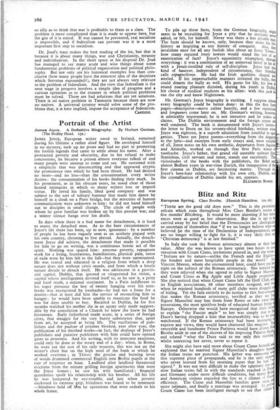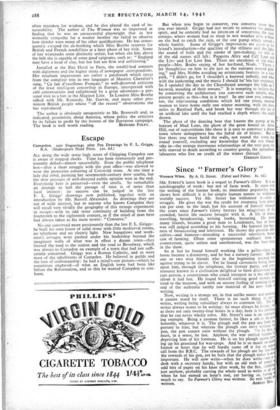Blitz and Ritz
European Spring. Clare Boothe. (Hamish Hamilton. nos. 6d.) " THEsE are the good old days now." This is the pessimis refrain which runs throughout Miss Clare Boothe's review five months' Blitzkrieg. It would be more alarming if her infer ences were as good as her observation. But she is apt to carried away by her belief that the Democracies are ideological] so uncertain of themselves that " if we no longer believe what believed [at the time of the Declaration of Independence], are no longer willing to -fight for it, it is very likely that ' Christian democracy' is at last finished."
In Italy she took the Roman aristocracy almost at their value. After she was known to have spent two hours in versation with Count Ciano, invitations poured in, and she writes " Italians are by nature—unlike the French and the Engli the kindest and most hospitable people in the world." Mr Vincent Sheean, whom she encountered later, could have put right on the subject of the Roman aristocracy. She noticed they were relieved when she agreed to refer to Signor Musso and Count Ciano as Big Apple and Little Apple respectivell She also noticed that when Count Ciano left the Golf Club, va its English associations, 68 other members resigned, and when he rejoined hundreds of rusty golf clubs were dragged of hiding. Yet she fails entirely to do justice to this fear-comp that makes the Roman aristocracy, terrified as they are Signor Mussolini may ban them from Rome or take away th possessions, the most spiritless body of educated human beings Europe. Otherwise she would have recognised that their fail to explain " the Fascist angle " to her was simply due to Duce's having dropped a hint that inscrutability was to be watchword. If the Roman aristocracy had been instructed express any views, they would have chattered like magpies. venerable and handsome Prince Putitova would have drawn Boothe aside in one of the alcoves of his imposing Palazzo Sp and related " what the Duce said to me only this morning' whilst entreating her never, never to repeat it.
She might also have said more about Count Ciano himsdf, explained that he married Signor Mussolini's daughter heo the Italian trains are punctual. His father was entrusted. sr this supreme piece of propaganda, and he is the only mum. who never learned from his morning paper that he had signed." It was not very difficult to make the relatively for slow Italian trains fall in with the standards reached in F and Germany under more difficult conditions, but many Br' and American visitors regarded the feat as a climax of F efficiency. The Ciano and Mussolini families grew more, more intimate, and finally a marriage was arranged. In. Pc''' Count Ciano has been intelligent enough to see that silence often mistaken for wisdom, and he also played the card of in- scrutability. The author of The Women was so impressed at finding that he was an unsuccessful playwright that in her womanly sympathy for a weaker brother she failed to observe how slender were many of his other qualifications. He has conse- quently escaped the de-bunking which Miss Boothe reserves for British and French notabilities at a later phase of her visit. Some of her wisecracks seem distinctly unfair, but when she hits above the belt she is capable of some good epigrams, such as : " England may have a head of clay, but her feet are firm and unfaltering."
Installed at the Ritz Hotel in Paris, she establi'hed contacts with diplomats and the higher strata of newspaper _orrespondents. Her resultant impressions are rather a patchwork which ranse from the complete text in two languages of Maurice Chevalier's song, " ca fait d'excellents Francais," to well-deserved criticism of the least intelligent censorship in Europe, interspersed with café conversations and enlightened by a great adventure—a per- sonal visit to a fort in the Maginot Line. In London Miss Boothe talked with Mr. Kennedy, Mr. Garvin, and many other pro- minent British people whose " off the record " observations she has reproduced.
The author is obviously antagonistic to Mr. Roosevelt and, as indicated, pessimistic about America, whose policy she criticises by its failure to profit by the lessons of the European campaign.
The book is well worth reading. BERNARD FOLEY.































 Previous page
Previous page